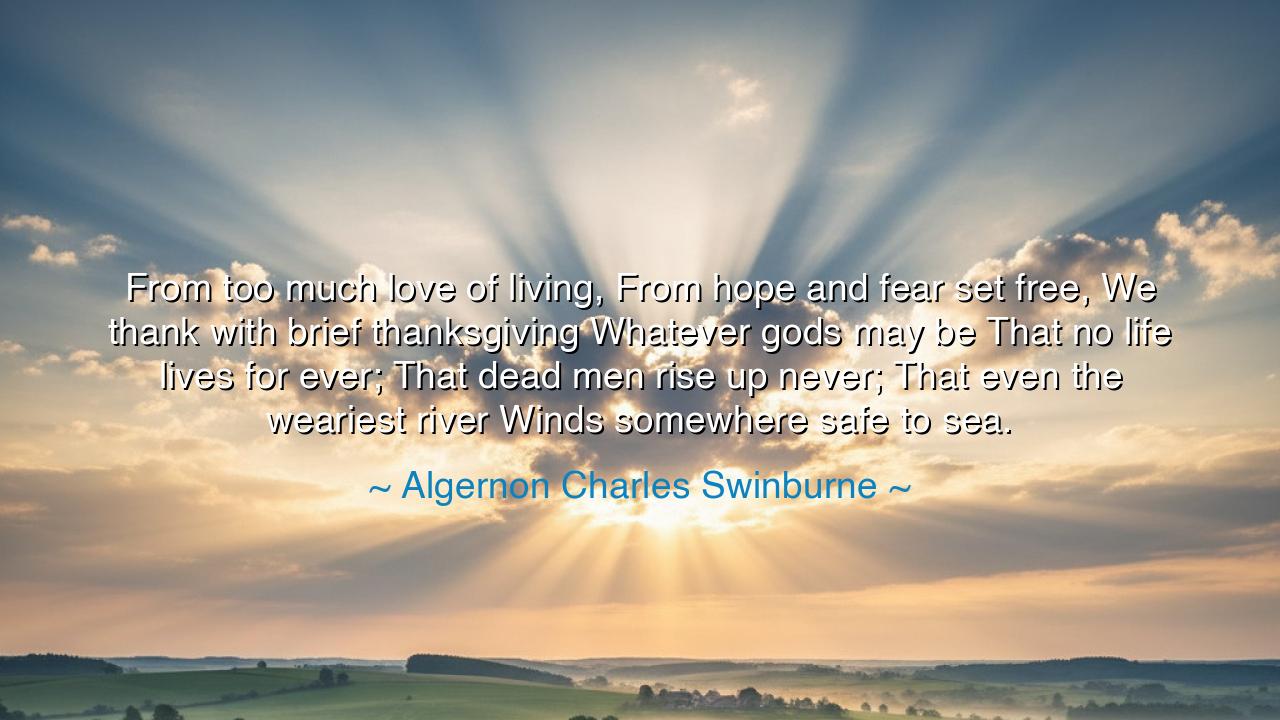
From too much love of living, From hope and fear set free, We
From too much love of living, From hope and fear set free, We thank with brief thanksgiving Whatever gods may be That no life lives for ever; That dead men rise up never; That even the weariest river Winds somewhere safe to sea.






Opening Scene
The dim light of the evening spills softly into the room, casting a warm, gentle glow across the space. The flickering of the candle on the table adds to the quiet intimacy between Jack and Jeeny as they sit side by side, their tea mugs resting before them. The world outside is quiet now, as the city hums softly in the distance, but inside, there’s a peaceful stillness in the air. Their conversation has turned inward, moving to something deeper, almost poetic.
Host: The soft rhythm of the evening feels almost reflective, as though time has slowed just enough for them to truly sit with their thoughts. Jeeny looks at Jack, a thoughtful expression on her face as she reflects on a passage she’s been thinking about.
Jeeny: (softly, her voice thoughtful) “I came across something by Algernon Charles Swinburne that really struck me. He wrote, ‘From too much love of living, from hope and fear set free, We thank with brief thanksgiving, whatever gods may be, That no life lives forever; That dead men rise up never; That even the weariest river winds somewhere safe to sea.’ Isn’t that a powerful way to look at life and death?”
Jack: (nodding slowly, his voice reflective) “It really is. It’s almost like a release — the idea that life is fleeting, that we aren’t meant to last forever. It speaks to the transience of life, but also to the peace that can come from accepting that. The ‘weary river’ winding ‘somewhere safe to sea’ feels like a release, a gentle ending.”
Jeeny: (smiling faintly, her voice calm) “Exactly. It’s about letting go, about acknowledging that everything has its time and place. We spend so much of our lives hoping, fearing, trying to hold onto what we can, but Swinburne’s words remind us that it’s okay to release. Life, death, everything in between — it’s part of the flow, part of the larger journey.”
Host: The quiet between them deepens, as though the weight of their conversation is sinking in, and the understanding of Swinburne’s words feels like a quiet truth. The light from the candle flickers softly, casting shadows on the walls as Jack leans forward slightly, his fingers tracing the edge of his tea mug.
Jack: (his voice softer, almost in awe) “It’s humbling, isn’t it? To think that the world moves in such a way — with cycles of life, of beginning and ending — and yet, we often want to fight against that natural flow. We want life to be permanent, to hold onto moments and people forever. But the beauty of it, as Swinburne says, is in the impermanence. It’s the fleeting nature that gives it meaning, that gives us something to be grateful for.”
Jeeny: (nodding, her voice gentle) “Yes, it’s that acknowledgment of our own transience that makes each moment so precious. Knowing that it won’t last forever makes it all the more meaningful, all the more worth living. Even the hardest times, the struggles, the weariness — they’re part of the journey that leads us to the peace of the sea.”
Host: The room feels heavier now, but not in a burdensome way — more like the weight of understanding, a gentle realization that the cycles of life are natural, and that each part of the journey is worth embracing. Jack sits back slightly, his thoughts clearly processing the depth of their conversation, while Jeeny watches him, her gaze full of understanding.
Jack: (his voice calm, almost resigned) “So, in a way, accepting death, accepting the end of things, is part of living fully. It’s a release, a freedom that allows us to truly appreciate what we have in the moment. The constant renewal — of life, of change, of beginnings and endings — it’s what gives life its meaning.”
Jeeny: (smiling softly, her voice reassuring) “Exactly. When we accept the impermanence, we free ourselves from the fear of losing things. We begin to live more fully, more present. And in that freedom, we find peace, knowing that life isn’t meant to last forever — it’s meant to be experienced, fully and completely, as it comes.”
Host: The firelight continues to flicker, casting soft shadows in the room, while Jack and Jeeny sit together in quiet understanding. Their conversation has drifted into a space of deep reflection — an acknowledgment that life’s beauty lies in its fleeting nature, that each moment is precious because it doesn’t last forever. The world outside continues its steady rhythm, but inside, they sit in the gentle peace of knowing that life, in all its transience, is worth celebrating.
Jack: (with a small, reflective smile, his voice gentler) “I think that’s the truth, isn’t it? That life’s beauty is in the impermanence, in the moments we have and the moments we let go of. It’s the cycle that makes it all meaningful.”
Jeeny: (nodding, her voice soft and reassuring) “Yes. And the peace comes when we embrace that, when we live with the understanding that we don’t need to hold on to everything. We just need to appreciate it, while we have it.”
Host: The evening stretches on, and the room feels filled with a quiet understanding. Jack and Jeeny have come to realize that the natural cycles of life — of beginnings and endings — are what make it all so valuable. The fleeting nature of life is not something to fear, but something to embrace, for in it lies the true beauty of living fully in every moment.






AAdministratorAdministrator
Welcome, honored guests. Please leave a comment, we will respond soon